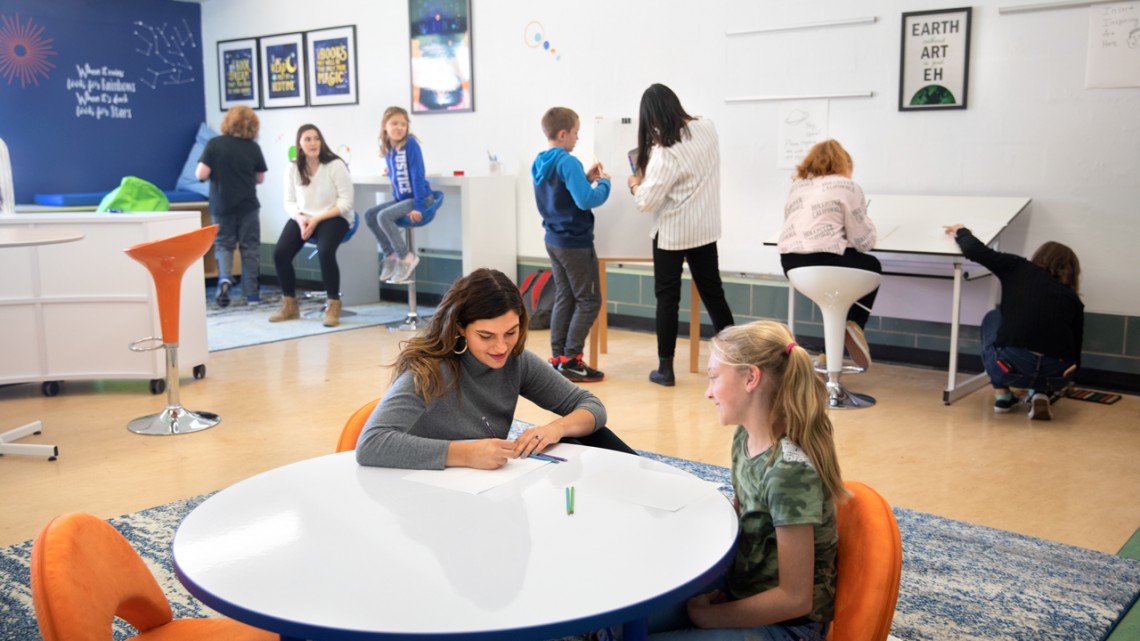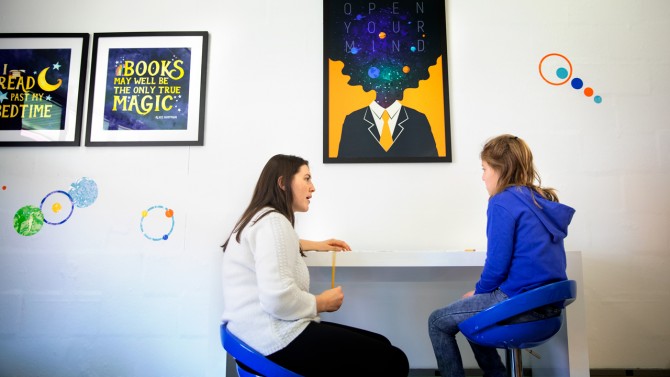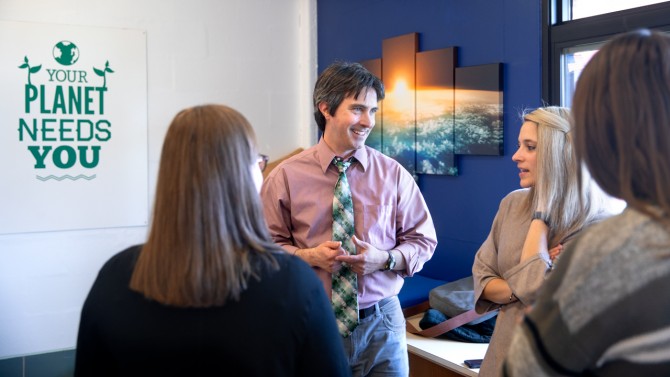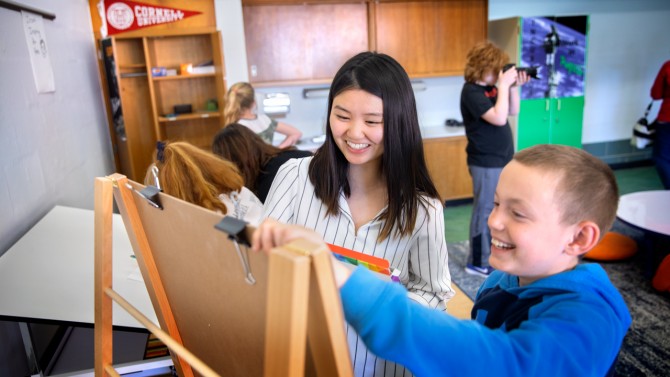
Ashlyn Smith ’19 works with Bailey Vliet during the dedication for the Space Station classroom April 24 at Groton Elementary School.
Project designs success for local elementary students
By Matt Hayes
A new learning space for Groton fifth-graders is out of this world.
The Space Station is the first of three auxiliary classrooms in the elementary school to be redesigned by a multidisciplinary crew of Cornell undergraduates. These rooms are meant to inspire and support older elementary students in practicing intellectual, interpersonal and planetary responsibility.
With minimal adult supervision, fish and plants to care for, and space-age furniture, décor and supplies to accommodate a range of interests and work styles, The Space Station is a prototype. After current fifth-graders use it and give feedback, the Cornell team will tweak the design and use the data to redesign other rooms.
The connection to Cornell was critical to the success of the project, said Groton Superintendent Margo Martin.
“Like many rural districts, our resources are limited,” Martin said. “We often have to make really hard choices about what’s possible given the fiscal status of the district.”
Said Martin as she scanned the room, while students focused on puzzles, painting and board games: “This is a great example of how an idea that we wouldn’t be able to accomplish on our own can be done – and done extremely well – with the help of Cornell.”
The Space Station was officially opened during a ribbon-cutting ceremony April 24 at the school. Martin said she plans to use the collaborative project as an example of a successful community partnership during an upcoming rural schools conference.
In one area of the room, fifth-grader Joshua Batzer worked on a drawing with Julia Kan ’21, a design and environmental analysis (DEA) major.
“I think the people who made this did a really good job,” Batzer said. “It’s actually pretty nice.”
The project was a partnership between elementary school principal Kent Maslin and Bryan Duff, a senior lecturer in the Department of Development Sociology in the College of Agriculture and Life Sciences. A former high school teacher who teaches educational psychology through community-engaged learning, Duff had a prior relationship with the elementary school. When Maslin offered another learning opportunity for his students, Duff leapt at the chance.
The work started in January as the Cornell students talked to kids, teachers and parents about what was needed. The undergraduates designed a space comfortable for young children that could enable interests from reading and writing to science projects and crafting.
The open space is colorful and lively. A bright three-panel mural adorns one wall. Showing an astronaut happily adrift in space, it was painted on a Saturday by students from Groton and Cornell. Plants line the windowsill, and a 10-gallon aquarium adds the movement of tropical fish and the sound of filtering water. “We wanted this to be a place of good mental health,” said Kan.
Kan was joined by DEA major Abby Lerner ‘21, fashion design and management major Alexandra Champagne ‘21, animal science major Cecilia Mondoza ‘21, human development major Austin Morgan ‘19 and psychology major Ashlyn Smith ‘19.
Duff said at the ribbon-cutting that the Space Station is meant as an educational escape for the students. The space is meant to inspire and help the kids get to know their own minds, collaborate better and care for the planet, Duff said.
“These are spaces for our students to experiment with what their learning needs to look and feel like to be effective,” Maslin said. “You don’t need to wait until you’re in college to figure out who you are; their brains are ready now. We want them to think about themselves as learners, and this space helps achieve that.”
Smith, a psychology major interested in how environments help students learn, said the student team was involved in everything – researching what kids wanted, choosing and ordering furniture, even painting the walls and designing the mural.
“We’ve spent so long thinking about what they might like, it’s exciting to see students with big smiles enjoying the space. For me, this is the first step in my future,” she said as she worked on an art project at a low table with fifth-grader Bailey Vliet.
Maslin praised the mentorship, leadership and guidance the college students provided. “I love the collaboration and the opportunity for our kids to learn from these amazing Cornell students,” he said.
Supported mostly by a grant obtained by Maslin, the project also benefited from Duff’s funding through the Engaged Faculty Fellows in Engaged Scholarship program. Engaged Cornell grants have supported many of the after-school and summer initiatives that Duff uses in his “students teaching students” approach to learning.
These kinds of projects are crucial elements of Cornell’s land-grant mission, Duff said. His students agree.
“We need to invest in kids in order to help all of our futures,” said Austin Morgan ’19, a human development major. “College kids are often tired and pessimistic and gray about the world, and adults are increasingly so. Kids just have an energy and an outlook that is just refreshing.”
Media Contact
Get Cornell news delivered right to your inbox.
Subscribe




